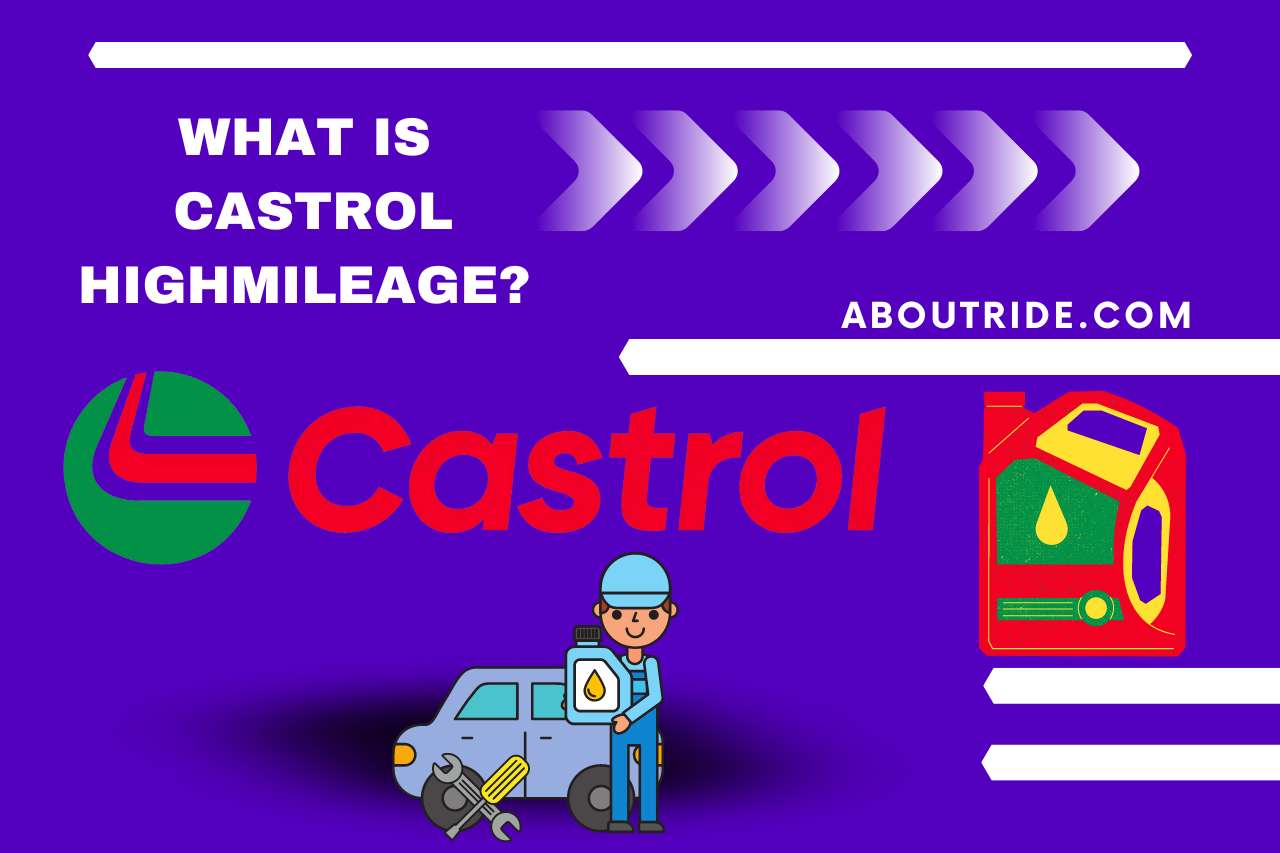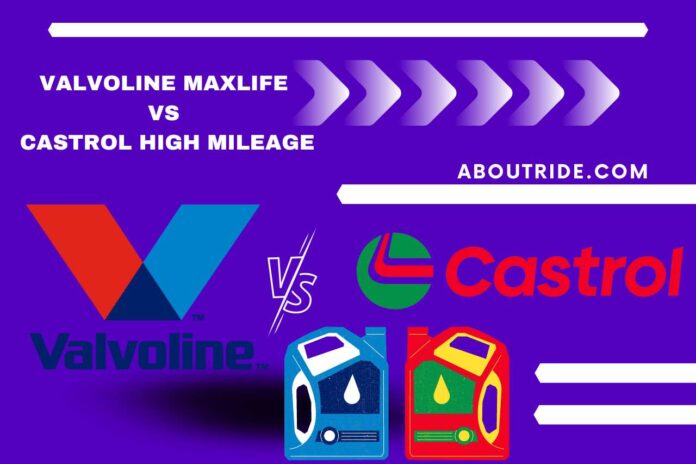Every internal combustion engine needs lubricant oil to reduce the damaging friction to the internal parts and reduce the high temperature due to the friction. A lubricant oil is so important as irrecoverable damage will be done if an engine is operated without or without the quantity recommended by the Original Equipment manufacturer. Various manufacturers use oil brands, and this article concerns Valvoline’s max life vs. Castrol’s high mileage. Valvoline and Castrol are reputed oil companies from the United States and the United Kingdom, and their reputed products are Max Life and High Mileage.
What is Valvoline Maxlife?
Valvoline Maxlife is a High-value engine oil. This synthetic product has been specially designed for high mileage (over 75,000 miles) engines, and it meets the requirements and standards of leading automotive and engine manufacturers. This product is a mixture of highly advanced additives which gives the following benefits to the engines.
- Expands the lifespan of engines with high mileage.
- Prevents engine wear off in all conditions.
- Provides instant oil flow at low temperatures, thus preventing engine wear off at startup and easy start.
- Special additives seal and prevents any leakages reducing oil consumption.
- Prevents and reduces engine deposits and sludge.
- Prevents and reduces leakages and friction and keeps the engines working smoothly.
What is Castrol HighMileage?
Similar to Valvoline Maxlife, Castrol High Mileage is a high-value synthetic engine oil that has been designed for vehicles that are done over 75,000 miles. The special additives included in this mixture Help prevent catalytic converter and emission system failure. The benefits of usage include the following.

- Reduces phosphorous in the engine oil, reducing wear off of the engine where phosphorous disrupts the catalytic converters and gives long life to the emission system.
- Prevents and reduces engine deposits and sludge.
- Oil burn-off protection exceeding industry standards.
- Special Sealing additives to prevent leakages.
- Prevents engine ware off.
- Ensures fuel economy by preventing leakages and smooth running of the engine.
Valvoline Maxlife vs Castrol High Mileage
Engine oil is used to accomplish certain tasks in the engine. It would be ideal to compare the two products by how much they contribute to accomplishing these tasks.
- Both products can be used in different types and make of engines. In earlier days’ engines could only use the recommended engine oil.
- Both products are available in different viscosities.
| Castrol | Valvoline |
| 5W-20 | 5E-30 |
| 5W-30 | 5W-40 |
| 10W-30 | 10W-40 |
| 10W-40 | 15W-40 |
| 20W-50 |
The oils should be only used on the guidance of the engine manufacturer on the viscosities.
- Engine (Vehicle) manufacturers’ recommendations for engine oil are important when comparing.
| Castrol | Valvoline |
| Audi | KTM |
| Volkswagen | Cummins |
| Jaguar | |
| Land Rover | |
| Aston Martin | |
| Mini | |
| Rolls Royce | |
| BMW |
More vehicle manufacturers use Castrol in their factories than Valvoline. Showing that vehicle manufacturers trust Castrol better.
- The price comparison for the two manufacturers is as below. This is a summarized statement as there are a lot of varieties in the same brand and type. These are Walmart prices for 5 quarts.
| Type | Castrol | Valvoline |
| 5W-30 Full Synthetic | 28.94 | 29.97 |
| 10W-30 Synthetic Blend | 22.47 | 22.96 |
| 10W-30 Conventional | 22.96 | 22.47 |
| High-Performance | 107.52 (10W60) | 63.45 (20W-50) |
The price is almost all the same except for high-performance Category engines, which are also for two different viscosities.
- The other way to compare the product is through tests conducted by independent organizations. The following test results are from Netes Interactive Auto.
Heat Dissipation and Evaporation Test
The test is conducted by heating two oil samples for a set time. The weight and the temperature before and after the test are marked.
A closer weight to the original after the test is better as it proves the lower evaporation level. Similarly, less heat-up is much better, which proves it to be a better cooling product. Test started at room temperature with full synthetic 5W-30 Oil.
| Test | Castrol | Valvoline |
| Heat Dissipation | 73.88 C (165 F) | 72.77 C (163 F) |
| Evaporation test | 0 g | 2.83 g |
This test shows that Castrol is less Heat dissipation but better (Less) in evaporation. But the difference between the two is significantly low.
Motor Oil Friction Test
The test uses a rotating metal wheel dipped in Oil, constantly grinding against a metal bearing. The theory is the better the protective film, the Oil creates less weight loss in the bearing. The original weight of each bearing is 16.44 g.
| Test | Castrol | Valvoline |
| Friction Test | 16.41 g | 16.41 g |
The Results show the same amount of resistance to the fiction by the two Oil manufacturers.
Another improved feature by Castrol is that it can replace the phosphorus with phosphorus replacement technology to extend the life of the emission system, which is both good for the vehicle and the environment.
All the above results conclude that both oils are similar, but Castrol is slightly better than Valvoline.
Can Valvoline MaxLife or Castrol High Mileage Improve Fuel Efficiency in Vehicles?
A better lubricant oil will help the engine to run smoothly. But using Valvoline MaxLife or Castrol High Mileage will improve fuel efficiency as there are special seal additives that prevent any leakages. By doing so, the engine will have better transmission of the power of the combustion. Also, there are improved Additives that reduce and prevent engine deposits, and sludge will make the engine run smoother.
The Phosphorus Replacement Technology will prolong the lifespan of the emission system. All the above reasons show an efficient and smooth engine running, which indicates improved fuel efficiency.
How Do the Prices of Valvoline MaxLife and Castrol High Mileage Compare?
As stated earlier in this article, the price difference between the two products is negligible. However, there are differences in the high-performance category but with different viscosities.
| Type | Castrol | Valvoline |
| 5W-30 Full Synthetic | 28.94 | 29.97 |
| 10W-30 Synthetic Blend | 22.47 | 22.96 |
| 10W-30 Conventional | 22.96 | 22.47 |
| High-Performance | 107.52 (10W60) | 63.45 (20W-50) |
Both Castrol and Valvoline companies are more than 100 years old, and they have made significant breakthroughs in the oil industry and made a huge impact on the social and economic conditions of the world. Though the Castrol shows a slight improvement, it would be a tough choice to choose between them.
Watch this video,
Video Credits – Synthetic Oil Protection
You May Also Like
- Does Low Oil Cause Overheating? (Symptoms Of Overheating)
- Pennzoil Synthetic vs Mobil 1 Synthetic – [Motor Oil Comparison]
- Pennzoil or Valvoline, Which is Better? Gratuity at Valvoline Oil Change!
- Motor Oil Brands to Avoid – Make Informed Decisions!!!
- Can the Wrong Oil Cause Overheating? (Avoid Overheating)
